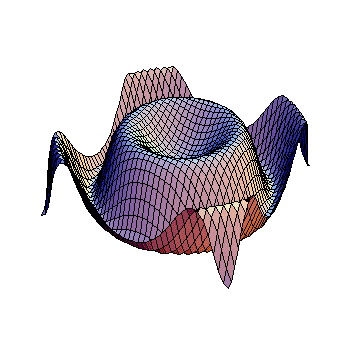Let's say that #u = x - (x^2 - a^2)^(1/2)#, so we have
#y = ln(u)#
And
#dy/dx = d/dx(ln(u))#
Using the chain rule #d/dx = d/(du)*(du)/dx#, so
#dy/dx = d/(du)(ln(u)) * (du)/dx#
#dy/dx = 1/u*(du)/dx#
We know that #u = x - (x^2 - a^2)^(1/2)# so
#(du)/dx = d/dx(x) - d/dx(x^2 - a^2)^(1/2)#
However, we can't derivate #(x^2 - a^2)^(1/2)# directly, but if we say #v = x^2 - a^2# we have
#(du)/dx = 1 - d/dx(v^(1/2))#
Using the chain rule
#(du)/dx = 1 - d/(dv)(v^(1/2))(dv)/dx#
#(du)/dx = 1 -v^(-1/2)/2(dv)/dx#
#(dv)/dx = d/dx(x^2 - a^2) = 2x# (If #a# is a constant)
So we have
#(du)/dx = 1 - v^(-1/2)/2*2x = 1 - xv^(-1/2)#
Putting it all together
#dy/dx = (1-xv^(-1/2))/u#
Substituing the values of #v# and #u#
#dy/dx = (1 - x(x^2 - a^2)^(-1/2))/(x - (x^2 - a^2)^(1/2))#
Rationalizing it
#dy/dx = ((1 - x(x^2 - a^2)^(-1/2))(x + (x^2 - a^2)^(1/2)))/(x^2 - x^2 - a^2)#
#dy/dx = (x - x^2(x^2 - a^2)^(-1/2) + (x^2 - a^2)^(1/2) - x)/(-a^2)#
#dy/dx = (- x^2(x^2 - a^2)^(-1/2) + (x^2 - a^2)^(1/2))/(-a^2)#
Multiplying both numerator and denominator by #(x^2 - a^2)^(1/2)#
#dy/dx = (-x^2 + x^2 - a^2)/(-a^2(x^2 - a^2)^(1/2))#
#dy/dx = (-a^2)/(-a^2(x^2 - a^2)^(1/2)) = 1/(x^2 - a^2)^(1/2)#
#dy/dx = (x^2 - a^2)^(-1/2)#
(Assuming #x > a#, or we'd have divided by zero (#x = a#) or have negative numbers in an even root)

